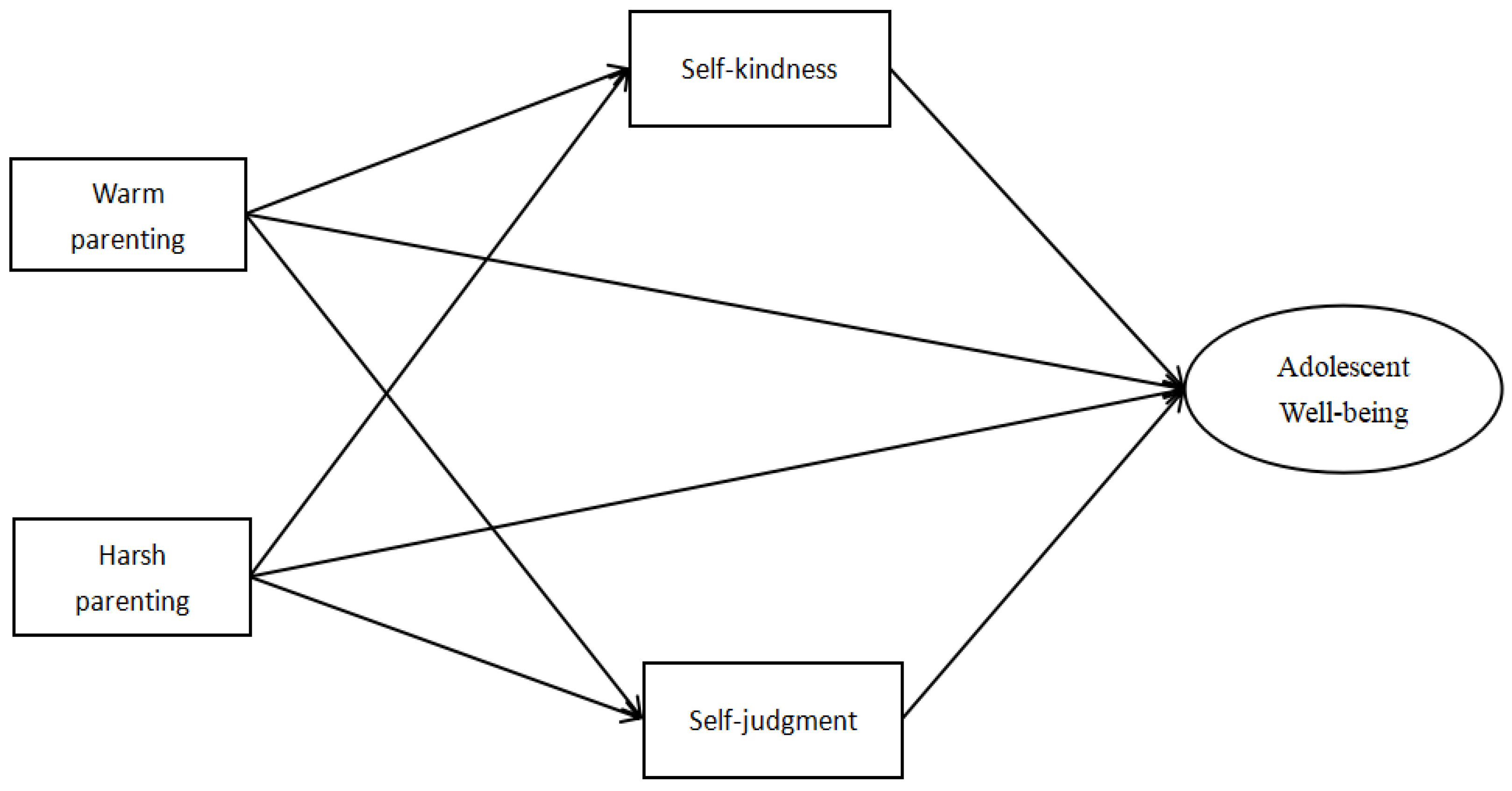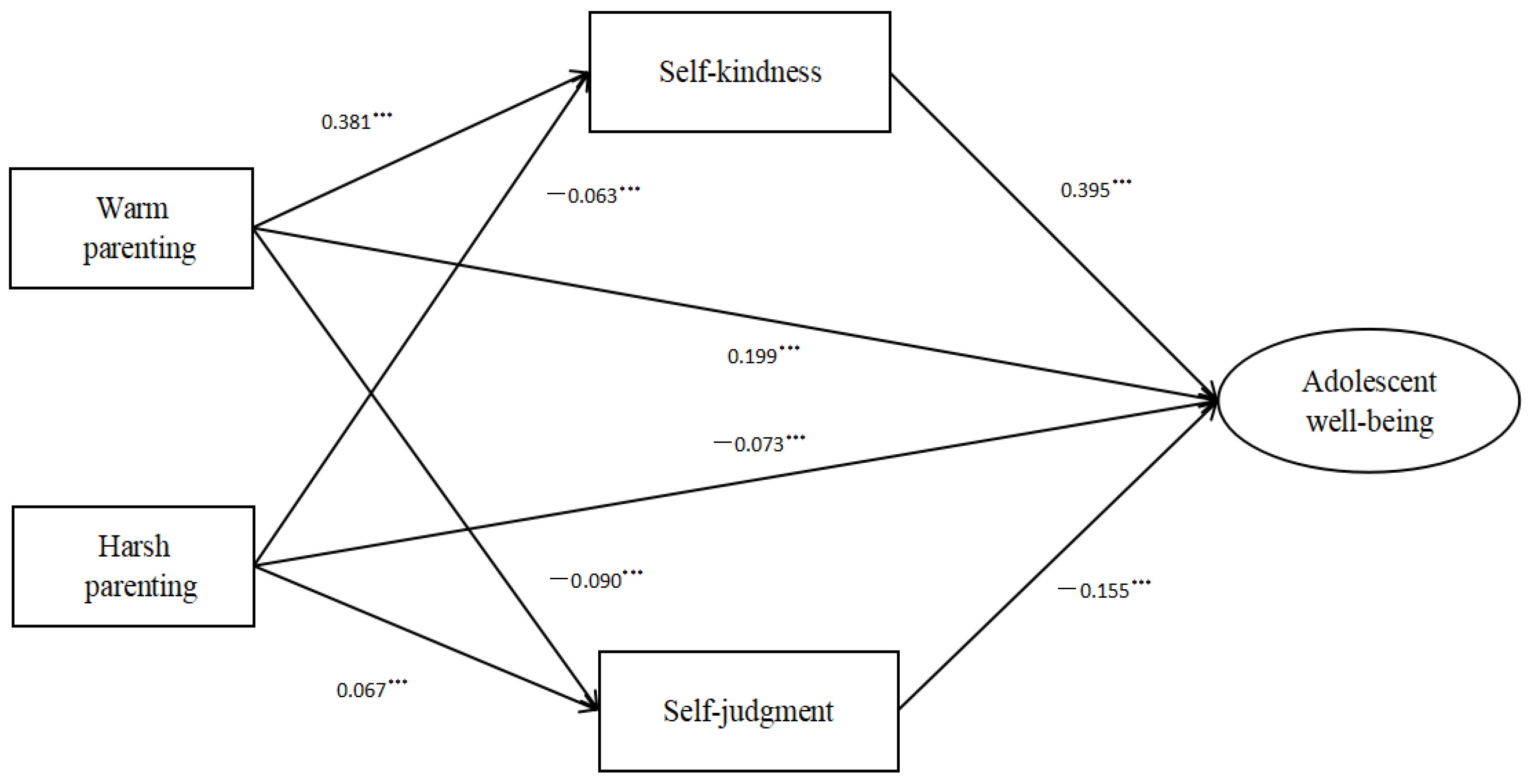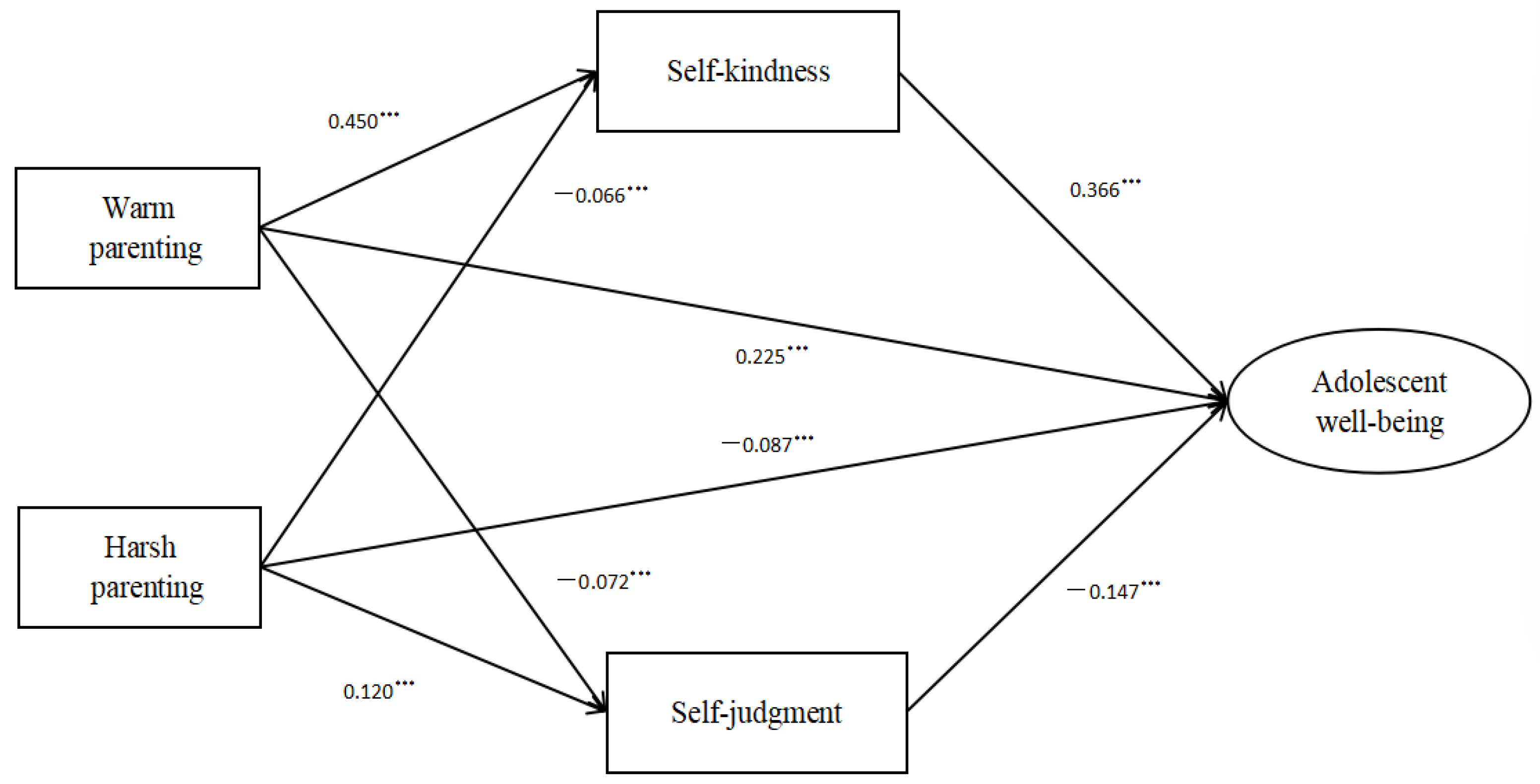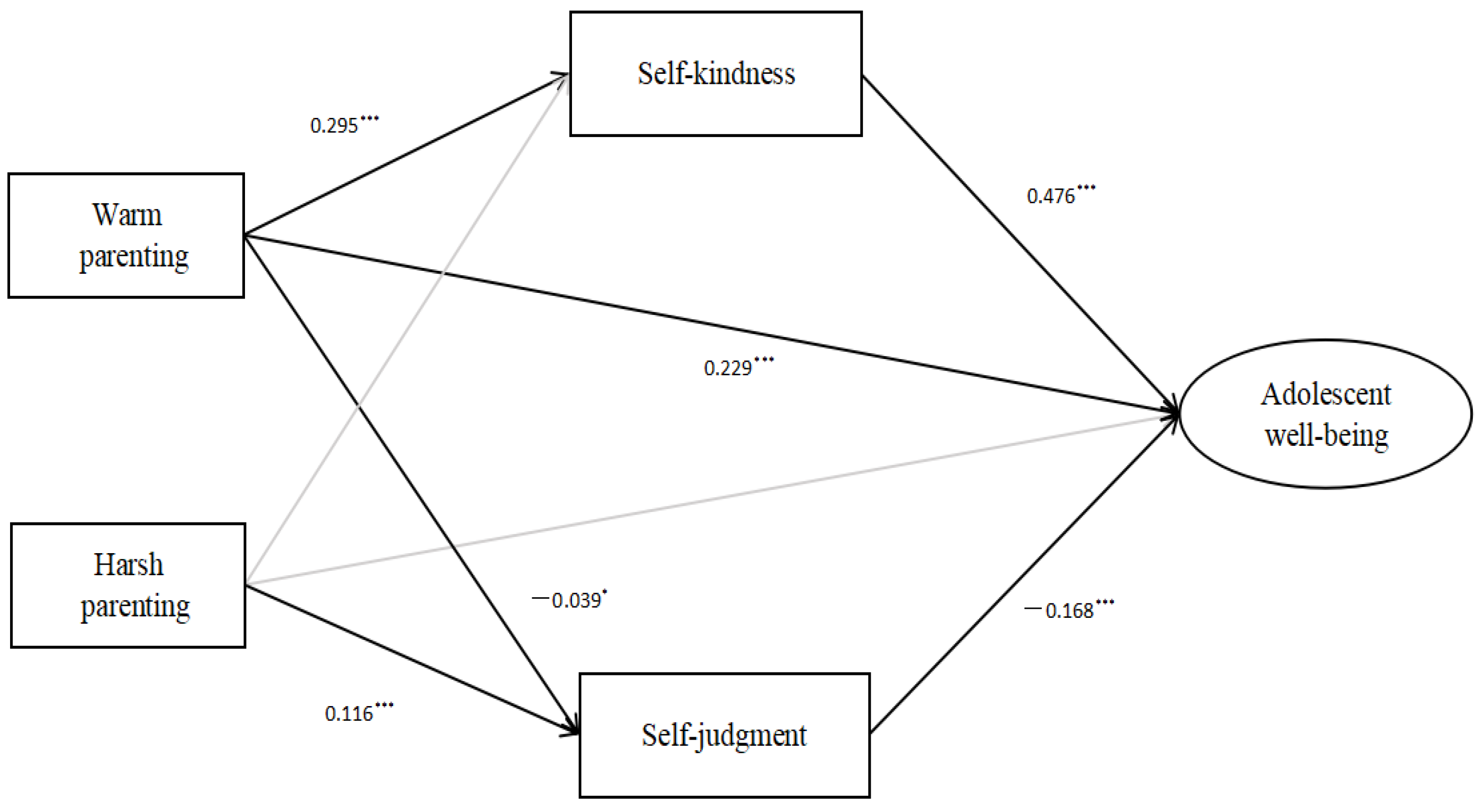Warm and Harsh Parenting, Self-Kindness and Self-Judgment, and Well-Being: An Examination of Developmental Differences in a Large Sample of Adolescents
Abstract
1. Introduction
1.1. Parenting and Adolescent Well-Being
1.2. The Mediating Roles of Self-Kindness and Self-Judgment
1.3. Developmental Differences
1.4. The Current Study
2. Methods
2.1. Procedure
2.2. Participants
2.3. Measurements
2.3.1. Warm and Harsh Parenting
2.3.2. Self-Kindness and Self-Judgment
2.3.3. Well-Being
2.3.4. Control Variables
2.4. Data Analysis
3. Results
3.1. Preliminary Analysis
3.2. The Mediation Model
3.3. Multi-Group Analysis across Developmental Stages of Adolescence
4. Discussion
4.1. Warm and Harsh Parenting and Adolescent Well-Being
4.2. The Mediating Effects of Self-Kindness and Self-Judgment
4.3. Developmental Differences
4.4. Future Directions
4.5. Limitations
4.6. Implications
5. Conclusions
Author Contributions
Funding
Institutional Review Board Statement
Informed Consent Statement
Data Availability Statement
Acknowledgments
Conflicts of Interest
References
- Bronfenbrenner, U.; Ceci, S.J. Nature-nurture reconceptualized in developmental perspective: A bioecological model. Psychol. Rev. 1994, 101, 568–586. [Google Scholar] [CrossRef] [PubMed]
- Darling, N. Ecological Systems Theory: The Person in the Center of the Circles. Res. Hum. Dev. 2007, 4, 203–217. [Google Scholar] [CrossRef]
- Ogg, J.; Anthony, C.J. Process and context: Longitudinal effects of the interactions between parental involvement, parental warmth, and SES on academic achievement. J. Sch. Psychol. 2020, 78, 96–114. [Google Scholar] [CrossRef]
- Leung, J.T.Y.; Shek, D.T.L. Parental Control and Adolescent Wellbeing in Chinese Adolescents in Hong Kong. Child Indic. Res. 2019, 13, 703–727. [Google Scholar] [CrossRef]
- Shek, D.T.L.; Chai, C.W.Y.; Dou, D. Parenting factors and meaning of life among Chinese adolescents: A six-wave longitudinal study. J. Adolesc. 2021, 87, 117–132. [Google Scholar] [CrossRef]
- Shek, D.T.L.; Liang, L.Y. Psychosocial Factors Influencing Individual Well-Being in Chinese Adolescents in Hong Kong: A Six-Year Longitudinal Study. Appl. Res. Qual. Life 2018, 13, 561–584. [Google Scholar] [CrossRef] [PubMed]
- Zhu, X.; Shek, D.T.L. Parental factors and adolescent well-being: Associations between developmental trajectories. Child. Youth Serv. Rev. 2021, 127, 106071. [Google Scholar] [CrossRef]
- Darling, N.; Steinberg, L. Parenting styles context: An integrative model. Psychol. Bull. 1993, 113, 487–496. [Google Scholar] [CrossRef]
- Medeiros, C.; Gouveia, M.J.; Canavarro, M.C.; Moreira, H. The Indirect Effect of the Mindful Parenting of Mothers and Fathers on the Child’s Perceived Well-Being through the Child’s Attachment to Parents. Mindfulness 2016, 7, 916–927. [Google Scholar] [CrossRef]
- Moreira, H.; Gouveia, M.J.; Canavarro, M.C. Is Mindful Parenting Associated with Adolescents’ Well-being in Early and Middle/Late Adolescence? The Mediating Role of Adolescents’ Attachment Representations, Self-Compassion and Mindfulness. J. Youth Adolesc. 2018, 47, 1771–1788. [Google Scholar] [CrossRef]
- Baumrind, D. The influence of parenting style on adolescent competence and substance use. J. Early Adolesc. 1991, 11, 56–95. [Google Scholar] [CrossRef]
- Zhang, W.; Wei, X.; Ji, L.; Chen, L.; Deater-Deckard, K. Reconsidering Parenting in Chinese Culture: Subtypes, Stability, and Change of Maternal Parenting Style during Early Adolescence. J. Youth Adolesc. 2017, 46, 1117–1136. [Google Scholar] [CrossRef]
- Liu, S.; Wang, X.; Zou, S.; Wu, X. Adolescent problematic Internet use and parental involvement: The chain mediating effects of parenting stress and parental expectations across early, middle, and late adolescence. Fam. Process. 2022, 61, 1696–1714. [Google Scholar] [CrossRef]
- King, V.; Boyd, L.M.; Pragg, B. Parent–Adolescent Closeness, Family Belonging, and Adolescent Well-Being across Family Structures. J. Fam. Issues 2018, 39, 2007–2036. [Google Scholar] [CrossRef]
- Cox, M.J.; Paley, B. Familes as systems. Annu. Rev. Psychol. 1997, 48, 243–267. [Google Scholar] [CrossRef] [PubMed]
- Minuchin, P. Families and Individual Development: Provocations from the Field of Family Therapy. Child Dev. 1985, 56, 289–302. [Google Scholar] [CrossRef]
- Hentges, R.F.; Wang, M.T. Gender Differences in the Developmental Cascade from Harsh Parenting to Educational Attainment: An Evolutionary Perspective. Child Dev. 2018, 89, 397–413. [Google Scholar] [CrossRef] [PubMed]
- Abidin, F.A.; Yudiana, W.; Fadilah, S.H. Parenting Style and Emotional Well-Being among Adolescents: The Role of Basic Psychological Needs Satisfaction and Frustration. Front. Psychol. 2022, 13, 901646. [Google Scholar] [CrossRef] [PubMed]
- Ren, W.; Zhu, X. Parental Mediation and Adolescents’ Internet Use: The Moderating Role of Parenting Style. J. Youth Adolesc. 2022, 51, 1483–1496. [Google Scholar] [CrossRef]
- Zhu, Q.; Cheong, Y.; Wang, C.; Tong, J. The impact of maternal and paternal parenting styles and parental involvement on Chinese adolescents’ academic engagement and burnout. Curr. Psychol. 2021. [Google Scholar] [CrossRef]
- Etkin, R.G.; Koss, K.J.; Cummings, E.M.; Davies, P.T. The Differential Impact of Parental Warmth on Externalizing Problems among Triangulated Adolescents. J. Genet. Psychol. 2014, 175, 118–133. [Google Scholar] [CrossRef] [PubMed]
- Li, S.; Lei, H.; Tian, L. A meta-analysis of the relationship between parenting style and Internet addiction among mainland Chinese teenagers. Soc. Behav. Personal. Int. J. 2018, 46, 1475–1487. [Google Scholar] [CrossRef]
- Liu, Q.; Wang, Z. Associations between parental emotional warmth, parental attachment, peer attachment, and adolescents’ character strengths. Child. Youth Serv. Rev. 2021, 120, 105765. [Google Scholar] [CrossRef]
- Chong, C.-H.; Yeo, K.-J.; Mislan, N. A Preliminary Study on Relationship between Warmth Parenting and Self-esteem among Young Adults based on Parental Acceptance-rejection Theory. J. Humanit. Soc. Sci. 2014, 19, 51–57. [Google Scholar] [CrossRef]
- Bowlby, J. Attachment and loss: Retrospect and prospect. Am. J. Orthopsychiatry 1982, 52, 664–678. [Google Scholar] [CrossRef] [PubMed]
- Guo, T.; Huang, L.; Hall, D.L.; Jiao, C.; Chen, S.T.; Yu, Q.; Yeung, A.; Chi, X.; Zou, L. The relationship between childhood adversities and complex posttraumatic stress symptoms: A multiple mediation model. Eur. J. Psychotraumatol. 2021, 12, 1936921. [Google Scholar] [CrossRef] [PubMed]
- Gilbert, P.; Procter, S. Compassionate mind training for people with high shame and self-criticism: Overview and pilot study of a group therapy approach. Clin. Psychol. Psychother. 2006, 13, 353–379. [Google Scholar] [CrossRef]
- Krieger, T.; Berger, T.; Holtforth, M.G. The relationship of self-compassion and depression: Cross-lagged panel analyses in depressed patients after outpatient therapy. J. Affect. Disord. 2016, 202, 39–45. [Google Scholar] [CrossRef]
- Ko, A.; Hewitt, P.L.; Cox, D.; Flett, G.L.; Chen, C. Adverse parenting and perfectionism: A test of the mediating effects of attachment anxiety, attachment avoidance, and perceived defectiveness. Personal. Individ. Differ. 2019, 150, 109474. [Google Scholar] [CrossRef]
- Dwairy, M. Parental Acceptance–Rejection: A Fourth Cross-Cultural Research on Parenting and Psychological Adjustment of Children. J. Child Fam. Stud. 2010, 19, 30–35. [Google Scholar] [CrossRef]
- Miranda, M.C.; Affuso, G.; Esposito, C.; Bacchini, D. Parental Acceptance-Rejection and Adolescent Maladjustment Mothers’ and Fathers’ Combined Roles. J. Child Fam. Stud. 2016, 25, 1352–1362. [Google Scholar] [CrossRef]
- Di Giunta, L.; Rothenberg, W.A.; Lunetti, C.; Lansford, J.E.; Pastorelli, C.; Eisenberg, N.; Thartori, E.; Basili, E.; Favini, A.; Yotanyamaneewong, S.; et al. Longitudinal associations between mothers’ and fathers’ anger/irritability expressiveness, harsh parenting, and adolescents’ socioemotional functioning in nine countries. Dev. Psychol. 2020, 56, 458–474. [Google Scholar] [CrossRef] [PubMed]
- Li, M.; Gong, H. Spare the rod, spoil the child?—Predictive effects of parental adult attachment on adolescent anxiety: The mediating role of harsh parenting. J. Affect. Disord. 2022, 312, 107–112. [Google Scholar] [CrossRef] [PubMed]
- Zou, S.; Wu, X.; Li, X. Coparenting Behavior, Parent-Adolescent Attachment, and Peer Attachment: An Examination of Gender Differences. J. Youth Adolesc. 2020, 49, 178–191. [Google Scholar] [CrossRef] [PubMed]
- Lu, S.; Wu, M.; Liu, S.; Dong, S.; Wang, Z.; Hao, Y. The predictive effects of maternal life event stress in early childhood on 5-year-old child behavioral problems: A chained mediation model. Acta Psychol. Sin. 2019, 51, 85–95. [Google Scholar] [CrossRef]
- Liang, J.; Shou, Y.; Wang, M.C.; Deng, J.; Luo, J. Alabama Parenting Questionnaire-9: A reliability generalization meta-analysis. Psychol. Assess. 2021, 33, 940–951. [Google Scholar] [CrossRef]
- Neff, K.D.; Bluth, K.; Toth-Kiraly, I.; Davidson, O.; Knox, M.C.; Williamson, Z.; Costigan, A. Development and Validation of the Self-Compassion Scale for Youth. J. Pers. Assess. 2021, 103, 92–105. [Google Scholar] [CrossRef]
- Huang, L.; Chen, Z.; Jiang, W.; Qu, D.; Wang, Y.; Fang, X.; Han, H.; Huang, C.; Li, Z.; Chi, X. Validation of the Chinese Version of Self-Compassion Scale for Youth (SCS-Y). Mindfulness 2022, 13, 3166–3178. [Google Scholar] [CrossRef]
- Moon, Y.S.; Kim, H.J.; Kim, D.H. The relationship of the Korean version of the WHO Five Well-Being Index with depressive symptoms and quality of life in the community-dwelling elderly. Asian. J. Psychiatr. 2014, 9, 26–30. [Google Scholar] [CrossRef]
- Lucas-Carrasco, R. Reliability and validity of the Spanish version of the World Health Organization-Five Well-Being Index in elderly. Psychiatry Clin. Neurosci. 2012, 66, 508–513. [Google Scholar] [CrossRef]
- Liu, H. Diagnostic value of WHO-5 Well-Being Index and the Back Depression Inventory on depression of patients with PD. J. Clin. Exp. Med. 2019, 18, 1107–1109. [Google Scholar]
- Dotterer, A.M.; Day, E. Parental Knowledge Discrepancies: Examining the Roles of Warmth and Self-Disclosure. J. Youth Adolesc. 2019, 48, 459–468. [Google Scholar] [CrossRef]
- Rickert, N.P.; Skinner, E.A. Parent and teacher warm involvement and student’s academic engagement: The mediating role of self-system processes. Br. J. Educ. Psychol. 2022, 92, e12470. [Google Scholar] [CrossRef] [PubMed]
- Janssen, L.H.C.; Verkuil, B.; van Houtum, L.; Wever, M.C.M.; Elzinga, B.M. Perceptions of Parenting in Daily Life: Adolescent-Parent Differences and Associations with Adolescent Affect. J. Youth Adolesc. 2021, 50, 2427–2443. [Google Scholar] [CrossRef]
- Chung, G.; Lanier, P.; Wong, P.Y.J. Mediating Effects of Parental Stress on Harsh Parenting and Parent-Child Relationship during Coronavirus (COVID-19) Pandemic in Singapore. J. Fam. Violence 2020, 37, 801–812. [Google Scholar] [CrossRef]
- Kim, S.Y.; Wang, Y.; Orozco-Lapray, D.; Shen, Y.; Murtuza, M. Does “Tiger Parenting” Exist? Parenting Profiles of Chinese Americans and Adolescent Developmental Outcomes. Asian Am. J. Psychol. 2013, 4, 7–18. [Google Scholar] [CrossRef]
- Loeb, E.L.; Kansky, J.; Tan, J.S.; Costello, M.A.; Allen, J.P. Perceived Psychological Control in Early Adolescence Predicts Lower Levels of Adaptation into Mid-Adulthood. Child Dev. 2021, 92, e158–e172. [Google Scholar] [CrossRef] [PubMed]
- Phillips, W.J. Self-compassion mindsets: The components of the self-compassion scale operate as a balanced system within individuals. Curr. Psychol. 2019, 40, 5040–5053. [Google Scholar] [CrossRef]
- Sun, X.; Chan, D.W.; Chan, L.-K. Self-compassion and psychological well-being among adolescents in Hong Kong: Exploring gender differences. Personal. Individ. Differ. 2016, 101, 288–292. [Google Scholar] [CrossRef]
- Bluth, K.; Blanton, P.W. The influence of self-compassion on emotional well-being among early and older adolescent males and females. J. Posit. Psychol. 2015, 10, 219–230. [Google Scholar] [CrossRef]
- Muris, P.; Petrocchi, N. Protection or Vulnerability? A Meta-Analysis of the Relations between the Positive and Negative Components of Self-Compassion and Psychopathology. Clin. Psychol. Psychother. 2017, 24, 373–383. [Google Scholar] [CrossRef] [PubMed]
- Neff, K.D.; McGehee, P. Self-compassion and Psychological Resilience among Adolescents and Young Adults. Self Identity 2010, 9, 225–240. [Google Scholar]
- Schwartz, O.S.; Byrne, M.L.; Simmons, J.G.; Whittle, S.; Dudgeon, P.; Yap, M.B.H.; Sheeber, L.B.; Allen, N.B. Parenting during Early Adolescence and Adolescent-Onset Major Depression: A 6-Year Prospective Longitudinal Study. Clin. Psychol. Sci. 2014, 2, 272–286. [Google Scholar] [CrossRef]
- Zhang, W.; Cao, Y.; Wang, M.; Ji, L.; Chen, L.; Deater-Deckard, K. The Dopamine D2 Receptor Polymorphism (DRD2 TaqIA) Interacts with Maternal Parenting in Predicting Early Adolescent Depressive Symptoms: Evidence of Differential Susceptibility and Age Differences. J. Youth Adolesc. 2015, 44, 1428–1440. [Google Scholar] [CrossRef]
- Lansford, J.E.; Rothenberg, W.A.; Riley, J.; Uribe Tirado, L.M.; Yotanyamaneewong, S.; Alampay, L.P.; Al-Hassan, S.M.; Bacchini, D.; Bornstein, M.H.; Chang, L.; et al. Longitudinal Trajectories of Four Domains of Parenting in Relation to Adolescent Age and Puberty in Nine Countries. Child Dev. 2021, 92, e493–e512. [Google Scholar] [CrossRef]
- Wang, J.; Li, M.; Geng, J.; Wang, H.; Nie, J.; Lei, L. Meaning in Life and Self-Control Mediate the Potential Contribution of Harsh Parenting to Adolescents’ Problematic Smartphone Use: Longitudinal Multi-Group Analyses. J. Interpers. Violence 2023, 38, 2159–2181. [Google Scholar] [CrossRef]
- McKinney, C.; Szkody, E. Parent and Child Depression: Moderated Mediation by Gender and Harsh Parenting in Emerging Adults. J. Fam. Issues 2018, 40, 594–612. [Google Scholar] [CrossRef]
- Yarnell, L.M.; Neff, K.D.; Davidson, O.A.; Mullarkey, M. Gender Differences in Self-Compassion: Examining the Role of Gender Role Orientation. Mindfulness 2018, 10, 1136–1152. [Google Scholar] [CrossRef]
- Bluth, K.; Campo, R.A.; Futch, W.S.; Gaylord, S.A. Age and Gender Differences in the Associations of Self-Compassion and Emotional Well-being in a Large Adolescent Sample. J. Youth Adolesc. 2017, 46, 840–853. [Google Scholar] [CrossRef]
- Liu, Q.-Q.; Yang, X.-J.; Hu, Y.-T.; Zhang, C.-Y. Peer victimization, self-compassion, gender and adolescent mobile phone addiction: Unique and interactive effects. Child. Youth Serv. Rev. 2020, 118, 105397. [Google Scholar] [CrossRef]
- Chao, R.K. The Parenting of Immigrant Chinese and European American Mothers: Relations between Parenting Styles, Socialization Goals, and Parental Practices. J. Appl. Dev. Psychol. 2000, 21, 233–248. [Google Scholar] [CrossRef]
- Deater-Deckard, K.; Lansford, J.E.; Malone, P.S.; Alampay, L.P.; Sorbring, E.; Bacchini, D.; Bombi, A.S.; Bornstein, M.H.; Chang, L.; Giunta, L.D.; et al. The Association between Parental Warmth and Control in Thirteen Cultural Groups. J. Fam. Psychol. 2011, 25, 790–794. [Google Scholar] [CrossRef]
- Supple, A.J.; Ghazarian, S.R.; Peterson, G.W.; Bush, K.R. Assessing the Cross-Cultural Validity of a Parental Autonomy Granting Measure: Comparing Adolescents in the United States, China, Mexico, and India. J. Cross-Cult. Psychol. 2009, 40, 816–833. [Google Scholar] [CrossRef]
- Wang, M. Harsh parenting and peer acceptance in Chinese early adolescents: Three child aggression subtypes as mediators and child gender as moderator. Child Abus. Negl. 2017, 63, 30–40. [Google Scholar] [CrossRef]
- Feinberg, M.E.; Mogle, J.A.; Lee, J.K.; Tornello, S.L.; Hostetler, M.L.; Cifelli, J.A.; Bai, S.; Hotez, E. Impact of the COVID-19 Pandemic on Parent, Child, and Family Functioning. Fam. Process. 2022, 61, 361–374. [Google Scholar] [CrossRef]
- Overall, N.C.; Low, R.S.T.; Chang, V.T.; Henderson, A.M.E.; McRae, C.S.; Pietromonaco, P.R. Enduring COVID-19 lockdowns: Risk versus resilience in parents’ health and family functioning across the pandemic. J. Soc. Pers. Relatsh. 2022, 39, 3296–3319. [Google Scholar] [CrossRef]
- Spinelli, M.; Lionetti, F.; Setti, A.; Fasolo, M. Parenting Stress during the COVID-19 Outbreak: Socioeconomic and Environmental Risk Factors and Implications for Children Emotion Regulation. Fam. Process. 2021, 60, 639–653. [Google Scholar] [CrossRef] [PubMed]
- Zou, S.; Wu, X.; Ren, Y.; Wang, X. Actor-partner association of work-family conflict and parental depressive symptoms during COVID-19 in China: Does coparenting matter? Appl. Psychol. Health Well Being 2022, 14, 434–452. [Google Scholar] [CrossRef]





| Variables | Adolescents | |
|---|---|---|
| N/M | %/SD | |
| Age | 13.53 | 2.08 |
| Gender | ||
| Boys | 7728 | 52.3% |
| Girls | 7048 | 47.7% |
| Only-child status | ||
| Only child | 3777 | 25.6% |
| Not an only child | 10,999 | 74.4% |
| Educational status | ||
| Primary school | 3098 | 21.0% |
| Lower general secondary school | 7228 | 49.0% |
| Higher general secondary school | 4450 | 30.0% |
| Variable | 1 | 2 | 3 | 4 | 5 | 6 | 7 | 8 |
|---|---|---|---|---|---|---|---|---|
| 1 gender | 1 | |||||||
| 2 age | 0.044 ** | 1 | ||||||
| 3 siblings | 0.007 | 0.079 | 1 | |||||
| 4 WAP | −0.129 ** | −0.044 ** | −0.060 ** | 1 | ||||
| 5 HAP | −0.140 ** | −0.064 ** | 0.043 ** | −0.249 ** | 1 | |||
| 6 self-kindness | −0.027 ** | −0.054 ** | −0.053 ** | 0.396 ** | −0.157 ** | 1 | ||
| 7 self-judgment | 0.197 ** | 0.076 ** | 0.033 ** | −0.106 ** | 0.089 ** | −0.049 ** | 1 | |
| 8 adolescent well-being | −0.176 ** | −0.096 ** | −0.014 | 0.432 ** | −0.192 ** | 0.529 ** | −0.238 ** | 1 |
| M | 8.781 | 10.279 | 9.533 | 7.911 | 12.906 | |||
| SD | 2.743 | 2.899 | 2.623 | 2.550 | 4.575 |
| Mediation Paths | Estimate | p | 95% CI | |
|---|---|---|---|---|
| Total sample | WAP→Self-kindness→WEL | 0.150 | <0.001 | [0.141, 0.159] |
| WAP→Self-judgement→WEL | 0.014 | <0.001 | [0.011, 0.017] | |
| HAP→Self-kindness→WEL | −0.025 | <0.001 | [−0.032, −0.018] | |
| HAP→Self-judgement→WEL | −0.010 | <0.001 | [−0.013, −0.007] | |
| Total effect of WAP (direct plus indirect) | 0.363 | <0.001 | [0.347, 0.379] | |
| Total effect of HAP (direct plus indirect) | −0.109 | <0.001 | [−0.124, −0.093] | |
| Early adolescence | WAP→Self-kindness→WEL | 0.164 | <0.001 | [0.148, 0.181] |
| WAP→Self-judgement→WEL | 0.011 | <0.001 | [0.005, 0.016] | |
| HAP→Self-kindness→WEL | −0.024 | <0.001 | [−0.035, −0.013] | |
| HAP→Self-judgement→WEL | −0.018 | <0.001 | [−0.023, −0.012] | |
| Total effect of WAP (direct plus indirect) | 0.400 | <0.001 | [0.370, 0.431] | |
| Total effect of HAP (direct plus indirect) | −0.129 | <0.001 | [−0.154, −0.104] | |
| Middle adolescence | WAP→Self-kindness→WEL | 0.165 | <0.001 | [0.151, 0.179] |
| WAP→Self-judgement→WEL | 0.011 | <0.001 | [0.006, 0.016] | |
| HAP→Self-kindness→WEL | −0.025 | <0.001 | [−0.037, −0.014] | |
| HAP→Self-judgement→WEL | −0.013 | <0.001 | [−0.018, −0.008] | |
| Total effect of WAP (direct plus indirect) | 0.370 | <0.001 | [0.345, 0.395] | |
| Total effect of HAP (direct plus indirect) | −0.117 | <0.001 | [−0.142, −0.092] | |
| Late adolescence | WAP→Self-kindness→WEL | 0.141 | <0.001 | [0.121, 0.160] |
| WAP→Self-judgement→WEL | 0.006 | 0.046 | [<0.001, 0.013] | |
| HAP→Self-kindness→WEL | −0.016 | 0.091 | [−0.035, 0.003] | |
| HAP→Self-judgement→WEL | −0.019 | <0.001 | [−0.028, −0.011] | |
| Total effect of WAP (direct plus indirect) | 0.376 | <0.001 | [0.344, 0.409] | |
| Total effect of HAP (direct plus indirect) | −0.063 | 0.002 | [−0.102, −0.023] |
Disclaimer/Publisher’s Note: The statements, opinions and data contained in all publications are solely those of the individual author(s) and contributor(s) and not of MDPI and/or the editor(s). MDPI and/or the editor(s) disclaim responsibility for any injury to people or property resulting from any ideas, methods, instructions or products referred to in the content. |
© 2023 by the authors. Licensee MDPI, Basel, Switzerland. This article is an open access article distributed under the terms and conditions of the Creative Commons Attribution (CC BY) license (https://creativecommons.org/licenses/by/4.0/).
Share and Cite
Ren, Y.; Chi, X.; Bu, H.; Huang, L.; Wang, S.; Zhang, Y.; Zeng, D.; Shan, H.; Jiao, C. Warm and Harsh Parenting, Self-Kindness and Self-Judgment, and Well-Being: An Examination of Developmental Differences in a Large Sample of Adolescents. Children 2023, 10, 406. https://doi.org/10.3390/children10020406
Ren Y, Chi X, Bu H, Huang L, Wang S, Zhang Y, Zeng D, Shan H, Jiao C. Warm and Harsh Parenting, Self-Kindness and Self-Judgment, and Well-Being: An Examination of Developmental Differences in a Large Sample of Adolescents. Children. 2023; 10(2):406. https://doi.org/10.3390/children10020406
Chicago/Turabian StyleRen, Yizhen, Xinli Chi, He Bu, Liuyue Huang, Shaofan Wang, Ying Zhang, Di Zeng, Hao Shan, and Can Jiao. 2023. "Warm and Harsh Parenting, Self-Kindness and Self-Judgment, and Well-Being: An Examination of Developmental Differences in a Large Sample of Adolescents" Children 10, no. 2: 406. https://doi.org/10.3390/children10020406
APA StyleRen, Y., Chi, X., Bu, H., Huang, L., Wang, S., Zhang, Y., Zeng, D., Shan, H., & Jiao, C. (2023). Warm and Harsh Parenting, Self-Kindness and Self-Judgment, and Well-Being: An Examination of Developmental Differences in a Large Sample of Adolescents. Children, 10(2), 406. https://doi.org/10.3390/children10020406





